Want to know more about the Best Schools For Criminal Justice In the US and make an informed decision? Here is a good place to start.
Choosing the ideal school for your criminal justice education can feel like an overwhelming task, with countless institutions boasting exceptional programs and faculty. Yet, making the right choice is essential for laying the groundwork for a successful career in this field.
In this blog post, we’ll guide you through the top schools for criminal justice, highlighting their unique strengths and offerings to help you confidently settle on the perfect institution.
Please note that schools are selected based on our criteria (at the end of the article), ranked by the latest acceptance rate.
Table of Contents
#25. Miami University


- Acceptance rate: 89%
- Average entry score: 1200-1340 SAT or 24-29 ACT
- Student-to-faculty ratio: 13 to 1
- Estimated cost of attendance (tuition and fees): $33,673-$53,409
- Average earning potential for graduates: $33,900 (College Simply)
Miami University offers a range of criminal justice programs that prepare students for various careers in the field. Graduates of these programs can pursue careers in law enforcement, corrections, private security, and more.
The programs provide students with a strong foundation in criminology and criminal justice system. Students also have opportunities for hands-on experiences through internships and fieldwork.
Miami University’s criminal justice programs have a strong track record of producing successful graduates who are well-equipped for the demands of the criminal justice profession.
Source: Miami University
#24. University of Mississippi


- Acceptance rate: 89%
- Average entry score: 1160-1600 SAT
- Student-to-faculty ratio: 16 to 1
- Estimated cost of attendance (tuition and fees): $27,046-$43,888
- Average earning potential for graduates: $26,900 (College Simply)
Criminal justice students at the University of Mississippi learn under the tutelage of highly respected professors in a college setting that provides a safe environment for learning.
The school’s approach to teaching is one that emphasizes collaboration, making it easy for students to learn from each other and develop the skills they need to succeed in the field of criminal justice.
This way, graduates are not only prepared for the job market but also equipped with the skills that will help them excel as professionals.
Source: The University of Mississippi
#23. Quinnipiac University


- Acceptance rate: 88%
- Average entry score: 1080-1300 SAT or 22-28 ACT
- Student-to-faculty ratio: 15 to 1
- Estimated cost of attendance (tuition and fees): $69,360
- Average earning potential for graduates: $31,800 (College Simply)
Quinnipiac University’s criminal justice program stands out as a top-tier choice for students seeking a comprehensive education in the field.
With its dedicated faculty, interdisciplinary approach, and focus on experiential learning, students gain a deep understanding of criminology, law enforcement, and social justice.
Internship opportunities, strong connections with industry professionals, and state-of-the-art facilities equip graduates with the skills needed to excel in their careers and contribute to society.
Source: Quinnipiac University
#22. Arizona State University

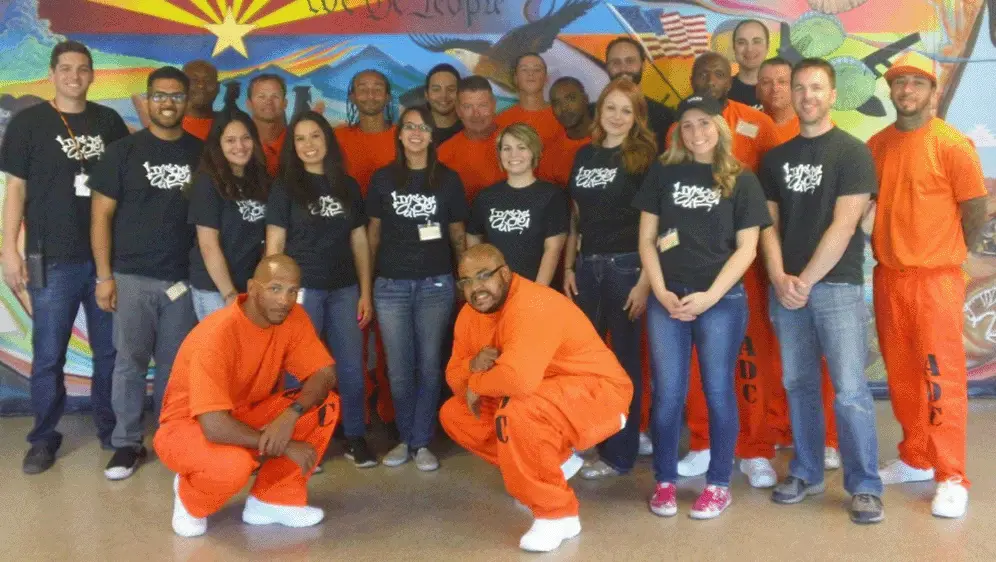
- Acceptance rate: 88%
- Average entry score: 1120-1180 SAT or 22-24 ACT
- Student-to-faculty ratio: 18 to 1
- Estimated cost of attendance (tuition and fees): $32,207
- Average earning potential for graduates: $48,700 (College Simply)
Arizona State University has developed a robust criminal justice program that provides students with a strong foundation in criminal justice theory, research and practice.
The objective of these programs is to produce well-rounded graduates who possess the knowledge and skills required to succeed in various criminal justice roles, including law enforcement, corrections, and the courts.
Graduates will have a broad understanding of the criminal justice system, the ability to analyze crime patterns, and the critical thinking skills necessary to tackle complex problems in the field.
Source: Arizona State University
Similar articles like this:
- Best Schools For Geography Degrees
- 25 Best Business Administration Schools In The US
- Best Schools For Forensic Science
#21. University of Arizona


- Acceptance rate: 85%
- Average entry score: 1120-1370 SAT or 21-29 ACT
- Student-to-faculty ratio: 17 to 1
- Estimated cost of attendance (tuition and fees): $30,416-$50,000
- Average earning potential for graduates: $33,300 (College Simply)
University of Arizona’s criminal justice program boasts a long and rich history of success in preparing students for careers in law enforcement, criminal justice, crime prevention, and other related fields.
The department is home to over 50 faculty members who are recognized experts in their respective disciplines.
Students enjoy a close-knit, collaborative learning environment that allows them to make the most of their time at the university. They leave with the skills and knowledge necessary to succeed in their chosen fields.
Source: University of Arizona
#20. Indiana University, Bloomington


- Acceptance rate: 85%
- Average entry score: 1230-1420 SAT or 27-32 ACT
- Student-to-faculty ratio: 17 to 1
- Estimated cost of attendance (tuition and fees): $11,447-$39,120
- Average earning potential for graduates: $55,100 (College Simply)
Indiana University Bloomington’s criminal justice programs stand out for their interdisciplinary approach, esteemed faculty, and research opportunities. Students prefer this institution due to its comprehensive curriculum spanning criminology, law, and public policy.
IUB’s strong connections with leading justice organizations provide internships and experiential learning, while the active student community fosters networking and collaboration.
Graduates leave equipped with the knowledge and skills necessary for successful careers in the criminal justice sector.
Source: Department of Criminal Justice
#19. Drexel University


- Acceptance rate: 83%
- Average entry score: 1240-1420 SAT or 27-32 ACT
- Student-to-faculty ratio: 10 to 1
- Estimated cost of attendance (tuition and fees): $76,524
- Average earning potential for graduates: $57,000 (College Simply)
Drexel University’s Criminal Justice programs emphasize a multidisciplinary approach to understanding and addressing issues within the criminal justice system.
Students are encouraged to think critically about the social, economic, and political factors that contribute to crime and justice and to explore evidence-based methods for prevention and intervention.
The curriculum is designed to provide a comprehensive understanding of the criminal justice system and its impact on individuals and communities while also addressing broader issues such as social justice and systemic inequality.
Source: Drexel University
#18. University of Arkansas


- Acceptance rate: 83%
- Average entry score: 1059-1220 SAT or 21-28 ACT
- Student-to-faculty ratio: 20 to 1
- Estimated cost of attendance (tuition and fees): $17,850-$38,541
- Average earning potential for graduates: $33,300 (College Simply)
University of Arkansas’ criminal justice graduates are the secret agents of the justice system, equipped with a well-rounded education that’s a perfect blend of theory and practice.
The curriculum is like James Bond’s gadgets, providing critical thinking and problem-solving skills that can take on any criminal mastermind.
They have the “license to thrill” with hands-on internships, networking opportunities, and faculty who are like the “Q” to their 007. These graduates are superheroes who can tackle complex criminal justice issues and save the day!
Source: University of Arkansas
Similar articles like this:
- 25 Best Schools For Insurance Degrees In The US
- Best Schools For International Relations
- 25 Best Digital Marketing Schools In The US
#17. University of Massachusetts


- Acceptance rate: 79%
- Average entry score: 1060-1280 SAT or 24-30 ACT
- Student-to-faculty ratio: 16 to 1
- Estimated cost of attendance (tuition and fees): $36,581
- Average earning potential for graduates: $36,700 (College Simply)
The University of Massachusetts boasts a distinguished faculty in their criminal justice programs, composed of both academic scholars and seasoned practitioners in the field.
These experts have published numerous books and articles on various topics related to criminology, criminal law, and criminal justice policy. They allow for a holistic and comprehensive education for students seeking to understand the intricacies of the criminal justice field.
Source: School of Criminology & Justice Studies
#16. University of Alabama Birmingham
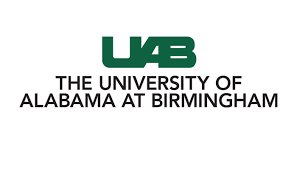

- Acceptance rate: 79%
- Average entry score: 1070-1330 SAT or 23-31 ACT
- Student-to-faculty ratio: 23 to 1
- Estimated cost of attendance (tuition and fees): $28,284-$47,754
- Average earning potential for graduates: $30,600 (College Simply)
The criminal justice program at the University of Alabama Birmingham provides a dynamic learning environment that prepares students for a career in law enforcement, corrections, or the legal system.
This program exposes students to a range of critical issues in criminal justice, including crime prevention, policing, and the administration of justice.
Students benefit from small class sizes, individual attention from faculty, and an interdisciplinary approach that draws from fields such as sociology, psychology, and political science.
The program emphasizes hands-on learning experiences, including internships and research opportunities, to enhance the student’s understanding of the criminal justice system.
Source: University of Alabama Birmingham
#15. Loyola University Chicago
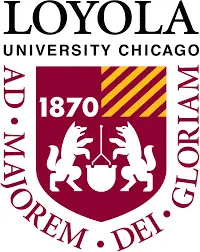

- Acceptance rate: 77%
- Average entry score: 1130-1320 SAT or 27-32 ACT
- Student-to-faculty ratio: 14 to 1
- Estimated cost of attendance (tuition and fees): $68,600
- Average earning potential for graduates: $36,400 (College Simply)
Loyola University Chicago provides criminal justice degree programs with a blend of theoretical knowledge and practical applications. The school offers undergraduate and graduate degree programs in criminal justice, as well as certificates and minors.
All students have access to career services and faculty mentors who are experts in their fields and can provide advice on job hunting. This way, students can be sure that they’re learning from the best and getting their foot in the door of this competitive field.
Source: Loyola University of Chicago
#14. Michigan State University
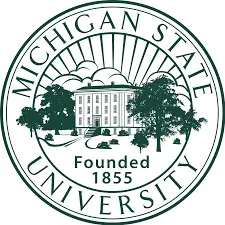

- Acceptance rate: 76%
- Average entry score: 1109-1320 SAT or 23-29 ACT
- Student-to-faculty ratio: 16 to 1
- Estimated cost of attendance (tuition and fees): $29,184-$54,590
- Average earning potential for graduates: $60,200 (College Simply)
Michigan State University’s criminal justice programs boast exceptional quality, expertly crafted to advance careers in law enforcement, corrections, and related fields. The program provides a solid grounding in the basic principles of criminal law and criminology, as well as training in practical skills.
MSU has many opportunities for students to gain real-world experiences through internships and hands-on learning. A degree from the School of Criminal Justice qualifies graduates to join an elite group that has made a significant impact on criminal justice.
Source: Michigan State University
Similar articles like this:
#13. Pennsylvania State University


- Acceptance rate: 74%
- Average entry score: 1200-1400 SAT or 26-32 ACT
- Student-to-faculty ratio: 14 to 1
- Estimated cost of attendance (tuition and fees): $36,484-$54,062
- Average earning potential for graduates: $48,200 (College Simply)
Pennsylvania State University’s criminal justice programs excel in producing skilled professionals and thought leaders. Students gain a comprehensive understanding of law enforcement, corrections, and the courts.
With a strong emphasis on research, internships, and real-world experiences, graduates emerge ready to contribute significantly to the field.
Graduates enjoy successful careers in law enforcement, policymaking, and academia, making a lasting positive impact on society’s approach to criminal justice.
Source: Penn State
#12. University of Illinois Chicago
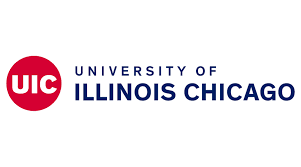
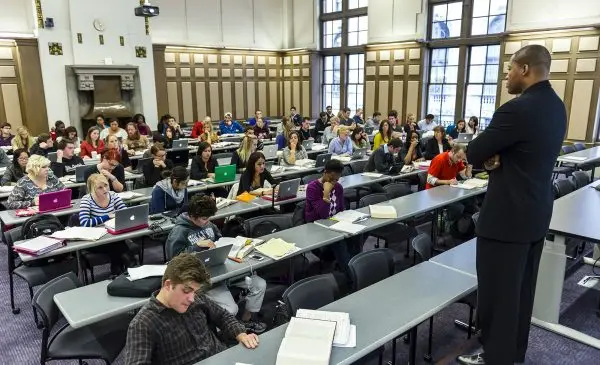
- Acceptance rate: 73%
- Average entry score: 1080-1310 SAT or 23-31 ACT
- Student-to-faculty ratio: 19 to 1
- Estimated cost of attendance (tuition and fees): $34,237-$48,587
- Average earning potential for graduates: $31,900 (College Simply)
The University of Illinois Chicago’s criminal justice programs excel due to their interdisciplinary approach, experienced faculty, and strong community partnerships.
Students benefit from a diverse curriculum, combining criminology theory and practical application. UIC’s focus on research, analysis, and real-world experience gives students a broad-based understanding of the justice system.
Graduates leave well-equipped to tackle contemporary issues, drive meaningful change, and excel in various criminal justice careers.
Source: University of Illinois Chicago
#11. Temple University


- Acceptance rate: 72%
- Average entry score: 1110-1340 SAT or 24-31 ACT
- Student-to-faculty ratio: 13 to 1
- Estimated cost of attendance (tuition and fees): $36,389-$50,899
- Average earning potential for graduates: $33,600 (College Simply)
Temple University’s Criminal Justice program excels in producing competitive graduates because of its innovative curriculum, experienced faculty, and robust internship opportunities.
Students gain a comprehensive understanding of the criminal justice system through hands-on learning, research, and real-world case studies.
Additionally, the program’s strong connections to local, national, and international agencies offer graduates a network to launch successful careers in law enforcement, corrections, and policy development.
Source: Temple University
#10. University of Pittsburgh


- Acceptance rate: 66%
- Average entry score: 1250-1470 SAT or 28-33 ACT
- Student-to-faculty ratio: 14 to 1
- Estimated cost of attendance (tuition and fees): $19,760-$36,000
- Average earning potential for graduates: $47,100 (College Simply)
The University of Pittsburgh’s criminal justice program combines a rigorous curriculum, renowned faculty, and practical experience, equipping graduates with a strong foundation for success.
Students gain valuable critical thinking, problem-solving, and communication skills, while internships and research opportunities provide real-world exposure.
The university’s strong network also connects graduates to potential employers, fostering a high job placement rate. This comprehensive approach ultimately drives the success of Pitt’s criminal justice graduates.
Source: University of Pittsburgh
Similar articles like this:
- 25 Best Schools For Economics In The US
- 25 Best Schools For Biology In The US
- 25 Best Schools For English Language and Literature in the US
#9. Florida International University


- Acceptance rate: 64%
- Average entry score: 1060-1240 SAT or 21-27 ACT
- Student-to-faculty ratio: 21 to 1
- Estimated cost of attendance (tuition and fees): $23,376-$35,774
- Average earning potential for graduates: $43,000 (College Simply)
Florida International University’s degree in criminal justice blends theory and practice to prepare you for a career in law enforcement or as a criminal justice professional.
The program is designed for students who want to work in the field of criminal justice, including careers in law enforcement and corrections, or who wish to pursue graduate school in criminal justice.
This university also provides career development services, including job placement assistance. Therefore, graduates of this program are equipped with the knowledge and skills to pursue a career in the criminal justice system or to continue on to graduate school.
Source: Florida International University
#8. University of South Carolina


- Acceptance rate: 62%
- Average entry score: 1100-1400 SAT or 21-32 ACT
- Student-to-faculty ratio: 18 to 1
- Estimated cost of attendance (tuition and fees): $30,409-$51,649
- Average earning potential for graduates: $32,900 (College Simply)
The University of South Carolina offers a detailed criminal justice program that prepares students for a range of careers in the field. Students can pursue undergraduate and graduate criminal justice degrees, as well as certificates.
This program provides students with a strong foundation in criminal justice theory and practice, including courses in criminology, law enforcement agencies, corrections, and criminal law. Students also have opportunities to gain real-world experience through internships and research projects.
Source: University of South Carolina
#7. University of Georgia


- Acceptance rate: 43%
- Average entry score: 1270-1450 SAT or 29-33 ACT
- Student-to-faculty ratio: 17 to 1
- Estimated cost of attendance (tuition and fees): $27,958-$46,998
- Average earning potential for graduates: $57,600 (College Simply)
The Criminal Justice Studies program at the University of Georgia is among the best in the country. With a focus on interdisciplinary studies and hands-on experience, students learn from experienced faculty members who are active in the field.
The program offers a wide range of courses, including classes on criminology, law enforcement, and the legal system. In addition, students have the opportunity to participate in internships and research projects, gaining practical skills and making connections in the field.
Source: UGA
What’s it like to study at the University of Georgia?
#6. San Diego State University


- Acceptance rate: 38%
- Average entry score: 1120-1330 SAT or 22-29 ACT
- Student-to-faculty ratio: 25 to 1
- Estimated cost of attendance (tuition and fees): $31,484-$43,364
- Average earning potential for graduates: $28,000 (College Simply)
The criminal justice programs at San Diego State University equip students with the knowledge and skills necessary to pursue careers in law enforcement, public safety, and related fields.
Through rigorous coursework and hands-on training, students gain a deep understanding of the criminal justice system. They are prepared to make a positive impact in their communities.
Graduates of these programs are well-prepared for careers in a variety of fields, including law enforcement, corrections, juvenile justice, and more, and are equipped to serve as leaders in their chosen professions.
Source: San Diego State University
Similar articles like this:
#5. Howard University


- Acceptance rate: 35%
- Average entry score: 1130-1280 SAT or 20-26 ACT
- Student-to-faculty ratio: 12 to 1
- Estimated cost of attendance (tuition and fees): $52,524
- Average earning potential for graduates: $52,800 (College Simply)
Howard University’s Criminal Justice program equips students with a comprehensive understanding of the criminal justice system, its operations, and societal implications.
Through a diverse curriculum, internships, and experiential learning opportunities, students acquire critical thinking, communication, and problem-solving skills.
This rigorous education, grounded in a historical and contemporary context, prepares graduates for various careers in law enforcement, corrections, legal services, policy analysis, and academia.
Source: Howard University
#4. Boston University


- Acceptance rate: 20%
- Average entry score: 1310-1500 SAT
- Student-to-faculty ratio: 11 to 1
- Estimated cost of attendance (tuition and fees): $79,606
- Average earning potential for graduates: $99,200 (College Simply)
Boston University offers innovative and diverse criminal justice programs that prepare students for careers in law enforcement, policy-making, and research. The curriculum is designed to be interdisciplinary, drawing from fields such as psychology, sociology, and political science.
Students have access to state-of-the-art facilities and technologies, including a crime scene house and a virtual courtroom. The faculty consists of experts in the field who are actively engaged in research and policy-making.
BU’s criminal justice programs are committed to promoting social justice and addressing issues of inequality within the criminal justice system.
Source: Boston University
What’s it like to study at Boston University?
#3. Northeastern University


- Acceptance rate: 11%
- Average entry score: 1430-1550 SAT or 33-35 ACT
- Student-to-faculty ratio: 15 to 1
- Estimated cost of attendance (tuition and fees): $78,202
- Average earning potential for graduates: $68,000 (College Simply)
Northeastern University’s criminal justice programs stand out for several reasons. Firstly, their curriculum is designed to be interdisciplinary, drawing from a range of fields such as sociology, psychology and law.
Secondly, students are required to complete co-op placements, giving them real-world experience in the field. Thirdly, the university has a wide range of research centers and institutes dedicated to criminal justice issues.
Finally, Northeastern’s faculty members are experts in their fields and are actively engaged in research and advocacy work. All of these factors contribute to making Northeastern’s criminal justice programs some of the best in the country.
Source: School of Criminology & Criminal Justice
What’s it like to study at Northeastern University?
#2. Harvard University


- Acceptance rate: 5%
- Average entry score: 1460-1580 SAT or 33-35 ACT
- Student-to-faculty ratio: 7 to 1
- Estimated cost of attendance (tuition and fees): $76,963
- Average earning potential for graduates: $75,900 (College Simply)
Harvard University trains criminal justice students through its top-tier Law School and Kennedy School of Government, combining rigorous academics, experiential learning, and interdisciplinary collaboration.
Students gain expertise in legal theory, policy analysis, and empirical research. Their success stems from the world-class faculty, extensive networking opportunities, and access to innovative research centers.
Graduates emerge as thought leaders and change-makers, equipped to tackle complex challenges in the criminal justice system.
Source: Harvard Law School
What’s it like to study at Harvard University?
#1. Stanford University


- Acceptance rate: 4%
- Average entry score: 1470-1570 SAT or 34-35 ACT
- Student-to-faculty ratio: 5 to 1
- Estimated cost of attendance (tuition and fees): $78,898
- Average earning potential for graduates: $74,400 (College Simply)
Stanford University nurtures criminal justice students by offering interdisciplinary courses, covering law, sociology, and psychology. Renowned faculty provide valuable insights while fostering critical thinking and problem-solving skills.
Students gain practical experience through internships, research, and collaborative projects. Stanford’s extensive network connects students with professionals and alumni, opening doors for career opportunities.
Their commitment to diversity and inclusion promotes a supportive environment, empowering students to excel in the criminal justice field.
Source: Stanford University
What’s it like to study at Stanford University?
Conclusion
Selecting the best school for your criminal justice education is pivotal to your career success. Thoroughly research each institution, considering factors like program offerings, faculty expertise, and practical opportunities.
Ultimately, the right choice will set the foundation for a fulfilling, impactful career in the criminal justice system—advocating for justice, upholding the law, and making a meaningful difference in society.
Selection Criteria
Here is a list of the factors we considered when selecting the best criminal justice schools:
Please note that the order in this list might vary by ranking criteria and sources.
- Reputation and ranking of the school: We looked for schools that have a strong reputation and high ranking in criminal justice.
- Faculty expertise, qualifications, and specialization: We researched the faculty members and their areas of expertise, and qualifications to ensure that the school has professors with relevant expertise and specialization in the areas of criminal justice that are of interest.
- Curriculum and resources: We evaluated the curriculum to ensure it aligns with students’ interests and career goals and considered the quality of the school’s facilities and resources, such as labs, equipment, and libraries.
- Opportunities for hands-on learning and research: We looked for schools that provide opportunities for hands-on experience through internships, co-op programs, or fieldwork.
- Student support services and alumni network: We considered the availability of support services and the strength of the alumni network in providing mentorship, internships, and job opportunities after graduation.
- Extracurricular activities and diversity: We evaluated the availability of extracurricular activities and clubs that align with students’ interests and considered the school’s diversity and inclusivity.
- Networking and post-graduation support: We researched the school’s network of alumni and their post-graduation support for criminal justice students, and also considered if the schools have a strong network of criminal justice professionals and researchers.
Frequently Asked Questions
Q1. How do I know which school is best for me?
There are many factors to consider when choosing a school, including the program you want to study and your career goals.
You should also consider the campus environment that best suits your learning style and personal needs.
Q2. How do I get into a good criminal justice school?
Criminal justice programs are highly competitive, so it’s important to choose a school with high admissions standards. You should also consider the average GPA and test scores of students accepted into the program.
Q3. What are the top criminal justice schools in the US?
The best schools for criminal justice are those that offer a wide range of degree options, including bachelor’s and master’s programs.
They also have strong faculty members who are experts in their field as well as strong alumni networks that can help students build their career.
Here are some of the best schools for criminal justice in the US:
- Boston University
- Northeastern University
- University of Georgia
- The University of Pittsburgh
Q4. What can I do with a degree in criminal justice?
There are many career options for graduates of criminal justice programs. You can be:
- Law enforcement officer
- Probation officer
- Parole officer
- Forensic scientist
Many people also pursue careers in social services or management positions within their current companies.
Q5. How do I apply for a criminal justice degree program?
The application process varies depending on the school you’re applying to and their requirements. You can find more information on each college’s admissions website or by contacting them directly.
References
[1] Official Websites
[2] Salary Data from Glassdoor, College Factual, Grad Reports, College Simply, and Zippia, among others
[3] Ranking references including news media such as Colleges Offering a Criminal Justice Major.


